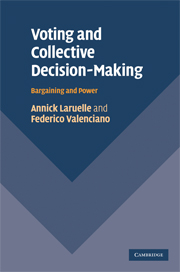Conclusions
Published online by Cambridge University Press: 28 July 2009
Summary
To conclude, we briefly summarize the main conclusions and claims of the book.
The first requisite for a sound normative theory for the assessment and choice of (dichotomous) voting rules is a precise specification of the type of committee, council or body that makes the collective decisions under consideration. It is not possible to provide a well-founded analysis or recommendation about a vaguely specified environment, as has been the case with the traditional voting power approach.
In this respect we have dealt separately with two extreme clearcut types of committee that make decisions under a yes/no voting rule as terms of reference: take-it-or-leave-it committees and bargaining committees, of which we have provided different models whose only shared ingredient is a (dichotomous) voting rule. Nevertheless, this does not exhaust all the possible environments though: other models are no doubt possible.
In neither type of committee is the question of ‘power’ or ‘voting power’ the first or primary issue that arises naturally, and nor can this issue be immediately addressed in a meaningful way. Each type of committee requires a different model and a different analysis, but in both cases the model proposed assumes individuals' behaviours to be consistent with the expected utility maximization model. The introduction of utilities allows (insofar as is possible) for a coherent, and unified approach to each type of committee. In particular, the normative question of the choice of voting rule for a committee of representatives of either type can be addressed by applying the egalitarian and utilitarian principles.
[…]
- Type
- Chapter
- Information
- Voting and Collective Decision-MakingBargaining and Power, pp. 172 - 175Publisher: Cambridge University PressPrint publication year: 2008



